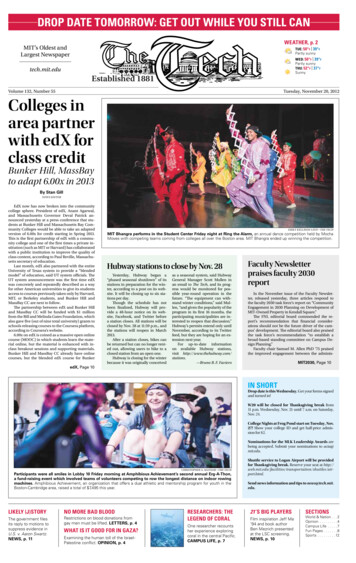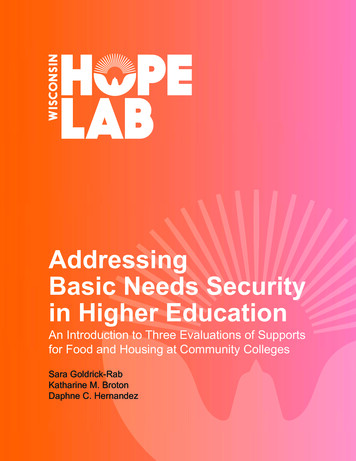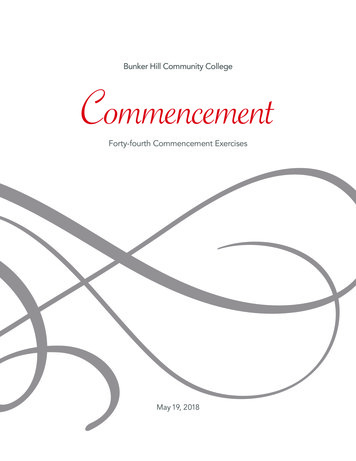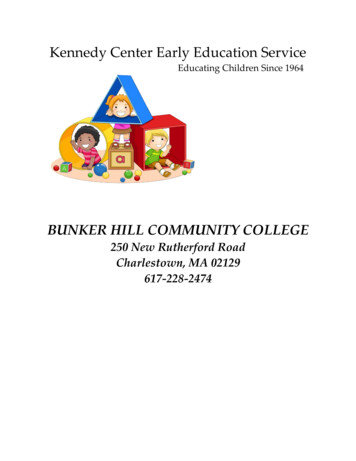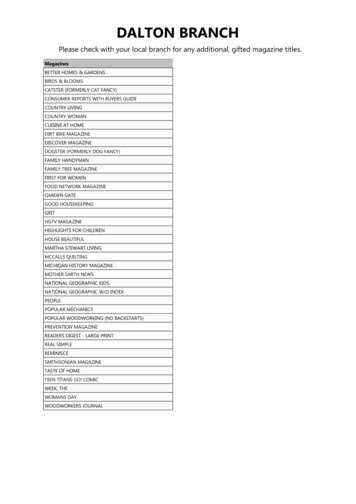
Transcription
Bunker Hill Community College MagazineOutspoken social critic shares storiesof his early days-and makes surpriserequest for fundsBlood WorkNew program takes shape in response togrowing demand for medical lab techniciansThe Quest for SustainabilityBHCC hosts first regional symposium ofthe American College and UniversityPresidents' Climate Commitment
Please supportThe Bunker Hill Community College Foundation, Inc.Because higher education should be an option for everyoneScholarships Textbook Assistance Program New Health & Wellness CenterDreamkeepers Student Emergency Assistance FundBHCC Foundation, Inc. I 250 New Rutherford AvenueI Room C304 I Boston, MA 02129 I 617-228-2395 I www.bhcc.mass.edu
Bunker Hill Community College Magazine I FalllWinter 2012 Vol . VII , No. 1BHCC. HI GoIop On the CoverIdeasIn This Issue2A Message from the President10Giving Thanks for VetsBHCC hosts mobile food pantry11Blood WorkNew degree program for thosewho don't faint at the sight of it19Upgrading the WorkforceBig grants mean preparing morestudents for better jobs20Glass ActBreakable beauty dazzles visitorsto BHCC Art GalleryMichael MoorePhoto: Richard Howard15Charting a Coursefor a Sustainable FutureBHCC hosts symposium ofNortheast colleges and universities17Meatless MondaysGiving a chicken a break31The Strange Historyof Nancy DrewEnglish professor uncovers cluesto girl detective's longevity32Three Days That CanChange Your LifeAt a Cape Cod retreat student leadersask each other and themselves somehard questionsAlumni2924Street Named in Honor of BHCCGraduate Killed in AfghanistanSergeant James Ayube memorializedby his home town38TV News Reporter WinsNational Journalism AwardAlum earns prestigiousEdward R. Murrow Awardfor television journalismSTAND By MeCollege rescues endangered programto promote nursing diversityPeople3Look Where They Are NowWellesley, Amherst, Mount Holyoke,Smith, Dartmouth, MIT5The Remarkable Journey ofU.S . Attorney Carmen OrtizChelsea Campus Hosts HispanicHeritage Celebration6Putting His MoneyWhere His Mouth IsMichael Moore's visit yieldssurprising dividends22The Things They Brought BackAuthor Tim O'Brien's paean toAmerica's veterans2436Great ScottDynamic science professora magnet for students30
BHCC Board of TrusteesJeanne-Marie BoylanChairRichard J. DeAgazioFirst Vice ChairIt is a pleasure to welcome you once again to BHCC Magazine.Second Vice ChairIncluded in this issue is news of an important sustainabilityevent at the College this fall. Bunker Hill Community Collegehosted the first regional symposium of the American Collegeand University Presidents ' Climate Commitment, bringingtogether representatives of higher education from the Universityof Maine, Springfield College, West Chester University, theUniversity of Rhode Island, Northeastern University, VermontTechnical College, Cornell University, and more than 40 othercolleges and universities throughout the Northeast. The twoday conference delved into challenges- and shared successes-in the effort to create carbon-neutralcampuses, infuse sustain ability into the curriculum, and become models for reducing greenhouseemissions nationally.James T. ChadwickMichael CharbonnierHung T. GoonAntoine Junior Melay*Colleen Richards PowellGerardo VillacresRichard C. Walker, IIIAnother important success highlighted in this issue is the receipt this fall of an infusion of fe deral andstate funding am ounting to more than 5 million. The competitive fun ds will enable us to expandpathways from high school to college with additional dual enrollment programs and increasedacademic and financial support, create new learning community clusters combining developmentaland college-level courses, create a new certificate program to train pharmacy technicians, launcha model entrepreneurship certificate, develop new courses for our planned degree in sustain abilitymanagement, boost the number of internships that place our students in key industries, and workwith individual students to create a personalized success plan called LifeMap that will guide theireducation and career development. In summary, these new initiatives are all geared toward helpingstudents finish what they start- and graduate.Editorial BoardColleen Roach, Ph.D., ChairJanice M. BonannoCaryn HirschChristopher Z. JonesDaniel M. Lam, Ed .D.Laura L. MontgomerySteven A. RollerJesse M. ThompsonKevin E. WeryBogusia Wojciechowska, Ph.D.This issue also covers our latest Compelling Conversations speaker, Michael Moore, and includesa profile of one of our most versatile faculty members, Scott Benjamin, as well as the story of aleadership retreat at Cape Cod that many students described as a life-changing experience.As always in these pages, we celebrate the lives and achievements of our alumni. This issue honorsthe passing of a Bunker Hill Community College graduate who was killed in the war in Afghanistan,and for whom a street in Salem has been named. We also celebrate the successful career of a graduatewhose work in the television industry has brought him major national recognition.And there's so much more. I invite you to enjoy.PresidentAwards for BHCC Magazine 2010-2011Un iversity and College Designers Association Award fo r Design; National Council fo r Marketi ngand Public Relations District One "Go ld " Awa rds fo r Overall Excellence and Origi na l Photography2Denise Bruno Matthews*Francesco S. TenaStudent Trustee* BHCC ALUMNIMary L. Fifield, Ph.D.PresidentEditorPatricia J . Bradyeditor@bhcc.mass.eduDesign DirectorCaryn HirschDesignersAnita WolfKaren WooWritersPatricia J . BradyCynthia DudaPeter N. DunnJohn FiskeFrances JarvisSusan Ryan-VollmarStephanie SchorowPhotographersRichard HowardNicholas B. ParkasKaren WooJames WoodsIllustratorsDavid VoginJames Yang
Look Where They Are NowStudents who started out at Bunker Hill Community College are taking the leap tofour-year institutions-including some of the most prestigious in the nationVeronika Kivenson at Mount Holyoke College, Fall 2011 .Mount Holyoke College junior Veronika Kivenson, Dartmouth Collegesenior John Around Him, and Smith College senior La'Kesha Francishave something in common: they all started their college careers atBunker Hill Community College.In transferring to the selective college they now attend, each has alsobenefited from a network of support at BHCC. Transferring is no meanfeat, for a community college student or anyone else, as those who havesucceeded will attest. Kivenson describes the work involved in makingthe transition from BHCC to Mount Holyoke-researching schools,writing essays and collecting recommendations-as the equivalent oftaking a full three-credit course. "There was so much paperwork! I reallyhad to manage my time;' she recalls.BHCC MagazineStudents at BHCC have long benefited from transfer help offeredby individual professors. Then, about five years ago, Professor NicoleGuilmette partnered with members of the science department atthe University of Massachusetts Boston on a grant from the NationalInstitute of Health called "Bridges to the Baccalaureate:' The programfostered relationships between community colleges and four-yearschools to promote the participation of under-represented groups in thebiological studies. As Guilmette became immersed in the work of helpingstudents transfer, she encountered numerous other faculty memberswho were doing the same, including Adjunct Professor of English WickSloane, Professor of ESL Andres R. Reyes and Professor of Science WilliamGriffin. Eventually, Guilmette was asked by President Mary 1. Fifield to3
"Since we started recruiting at community colleges, BHCC has demonstrated sincere and genuine supportnot only for its students looking to transfer to selective colleges, but also for building a relationship withAmherst. Our mutual focus is on finding students who are the right fit for our school, and this has been a keytenet of our successful relationship. I appreciate the time and honest effort BHCC takes when encouragingstudents to consider Amherst and the dialogue we have when following up with students and colleaguesabout prospective transfers throughout the academic year. It is a pleasure to work with BHCC faculty aswell as a benefit to Amherst to have BHCC students on our campus:'- Alexandra Hurd, Assistant Dean of Admission, Amherst Collegechair a new committee to help connect students with leading collegesand universities.As that initiative evolved, the need to establish more formal relationshipswith admissions offices at four-year colleges became clear, and last summerPresident Fifield appointed Sloane Senior Special Programs Coordinatorfor College Transfer. "The high schools that send students to selectivecolleges have many full-time people whose job is to make sure thosestudents get in:' says Sloane. "Once you realize that, it's clear that withnobody to go to bat for them, Bunker Hill students are at a disadvantage:'But what does going to bat for them mean? Sloane says he's nottalking only about helping with paperwork and writing recommendations.He's talking about the process of educating decision-makers in theadmissions offices at Amherst, Dartmouth and other schools aboutBHCC's curriculum."Admissions officers, for all the right reasons, do not want to admitpeople who are going to fail:' says Sloane. "So we need to explain thatan A in calculus or an A in biology at Bunker Hill Community Collegematches what they're teaching and that, in many cases, we're teachingfrom the same textbooks-because they likely don't know a lot about usand the quality of our academics. Our faculty work very hard to make surethat credits earned at BHCC are transferrable anywhere:'The outreach by Sloane and other faculty is clearly paying off. Moreand more students transfer to four-year institutions every year, and agrowing number of them are getting into leading colleges like Dartmouth,Amherst, Smith, Mount Holyoke and Wellesley. As this issue of BHCCMagazine goes to press, student Mahesh Thapa received the news thathe had been accepted at MIT-with a substantial scholarship."I'm very impressed with Bunker Hill Community College. I thinkthey're really at the cutting edge of things. They offer classes at night, theyoffer classes seven days a week:' says Sidonia M. Dalby, Associate Directorof the Office of Admission at Smith College, who adds that the students whohave transferred to Smith from BHCC have done well. "I think there's acultural adjustment for a lot of students and an academic adjustment.But, you know, they do so beautifully here, they end up doing very well:'For Kivenson, who is majoring in biochemistry, the biggest adjustmenthas been cultural. She was admitted to Mount Holyoke as a FrancesPerkins scholar, which is for older students who "follow unconventionalpaths" to college and Kivenson received a full scholarship that coversher tuition and living expenses. At 24, she is a few years older than mostof her classmates, and she is also from Ukraine. "It's been a difficulttransition and the adjustment has been challenging:' says Kivenson,who intends to apply for graduate school when she has completed herstudies at Mount Holyoke. "But there's a lot of support here and thingsare going extremely well:'For John Around Him, 29, the hardest adjustment in going fromBunker Hill Community College to Dartmouth was the simple fact that4he did not have the same skill set as many of his classmates. "I comefrom an impoverished community," says Around Him, an Oglala Siouxfrom South Dakota, who served in the U.S. Army in Iraq. "I attended apoorly functioning high school with a high dropout rate:' He says that,compared with many of his peers at Dartmouth who attended excellentpublic and private high schools, he had a lot of catching up to do, althoughBHCC provided him with a solid foundation in terms of learning how towrite papers and study."I think in that transition I began to learn about myself:' says AroundHim, who is studying education and plans to teach back home on thePine Ridge Reservation when he finishes his education. "I was learningabout the way I learn, and one thing I've learned is that there is value innaming your difficulties and getting help with them:'That kind of self-awareness coupled with the ability to take initiativeis exactly what Maggie Farnsworth, the Associate Director of Admissionat Wellesley College, searches for in new students. "We're looking forevidence of intellectual engagement in the classroom," says Farnsworth,who actively recruits students from community colleges. "But we go beyondlooking at grades. We're looking for the type of students who reallymaximized their opportunities at Bunker Hill:'The essence of Sloane's job is to help admissions officers identifysuch students. "It's like being a matchmaker-almost a dating servicebringing together students and the colleges that are right for each other:'says Sloane. "Fortunately, faculty are excellent talent spotters:' he adds.They help identify students and also offer direct support through thenetwork of connections established by Sloane. David Le won admission toAmherst College this fall after Monica Poole, Assistant Professor of Historyand Social Sciences, and Lloyd Sheldon Johnson, Professor of BehavioralScience, responded to a query from the admissions office about Le'sbackground in their fields. They turned around the request for informationover a weekend, and Le, who graduated from Medford Technical VocationalHigh School, where he studied auto mechanics, soon received the muchanticipated acceptance via e-mail. "I knew it was a big deal when one ofmy other professors who had encouraged me, Liya Escalera, started tocry when I gave her the news:' Le said.For Francis, 21, a suggestion from Sloane made all the difference.Intimidated by the transfer process and "fearful" that she would not beadmitted to any schools because she was coming from a communitycollege, Francis applied to Smith after Sloane recommended it. Althoughinitially not interested in applying to an all-women's school or attendingcollege in a less populated area, Francis followed up on a suggestionfrom Sloane that she visit the campus."It turns out that I really liked Smith-and I got in:' says Francis, whois studying biology and intends to apply to medical school after she hasearned her undergraduate degree. "I've learned not to be afraid. Fearshould not stop you from doing anything in life:'BHCC Magazine
The Remarkable Journey of Carmen OrtizFrom a housing project in Spanish Harlem to the jobof top federal prosecutor in MassachusettsKeynote speaker Carmen Ortiz, the firstHispanic and first woman U.S. Attorney forMassachusetts, captivated the audience ofstudents, staff, and dozens of representativesof Chelsea's civic and nonprofit world withthe remarkable story of her personal life andthe deeply-felt advice she wished to pass onto the young people present. But she waspreceded at the podium by an eloquentBunker Hill Community College student witha compelling story of her own at the Chelseacampus's celebration of Hispanic HeritageMonth on October 4, 2011.Stephanie De La Cruz, the StudentGovernment Association's Vice Presidentfor Communications, described to theaudience how her parents came to the UnitedStates from Lima, Peru, in 1988. Her fatherleft for America first and her mother followedlater. With little money, her mother hitchhiked, barefoot, traveling for more than amonth with little food or sleep. Stopped atone point for documents, she prayed thatthe baby in her arms would inspire leniency,and after a terrifying moment, the authoritiespassed over her.Finally united in America, the couple livedwith 20 others in a two-room apartment,where they slept on a porch, in the cold.Stephanie's father worked in a nursing home,\\1 saw myself as a Hispanicwoman of modest means, butwith an opportunity to excelto make a difference./Idoing the hard, unpleasant chores that fewar,e willing to do. The couple's first lawyer,she said, took all of their money; the secondfinally secured their residency in 1999."This is my heritage," De La Cruz said,with tears in her voice. "And BHCC is myextended family. The College has helped mefind my voice, and what I want to do."Bunker Hill Community College PresidentMary 1. Fifield thanked De La Cruz forsharing her story and congratulated her onBHCC Magazinehaving parents who were so courageous.The President then introduced guestspeaker Carmen Ortiz. As U.S. Attorney forMassachusetts, the President explained,Ortiz supervises the prosecution of all federalcrimes in the state, from civil rights violationsand white-collar crime to matters involvingterrorism and national security."I look out at you," Ortiz said, addressingthe students in the audience, "and I see abit of myself." She told them how in her twoyears as U.S. Attorney for Massachusetts shehad "never worked so hard or loved a jobso much." But on the road to the office ofthe state's top prosecutor, she confessed, shehad often felt isolated. She had been one ofvery few Hispanics in her law school, andas a prosecutor, she had worked in a maledominated world.Ortiz was born in New York City andgrew up in a housing project in SpanishHarlem. She said that her parents had comefrom Puerto Rico to America with verylimited educations. Although neither hadcompleted high school, she told the audience,both believed education to be the key totheir daughter's future, and they gave herstrenuous encouragement. "I saw myself asa Hispanic woman of modest means, butwith an opportunity to excel-to make adifference," she said.Like many students at Bunker HillCommunity College, Ortiz was the first inher family to attend college. "The challengeswere steep," she said. But she made it throughcollege and law school and started her careerin a Justice Department program, where sheworked for Eric Holder, now Attorney Generalof the United States, and the first AfricanAmerican to hold that post. Her first piece ofadvice to the younger generation: maintaingood relations with fellow workers, and stayin touch with them.More important, Ortiz urged the studentsto dare to dream, to surround themselves withpeople who believe in them, and to ignore thelimitations imposed by stereotypes, especiallyabout working women having children-evenCarmen Ortiz speaks at the Chelsea Campusthough success may sometimes mean puttingone's job first. Soccer games and dancerecitals? She has missed her share, she said,as she balanced work and family againstlong-term priorities.Learn to benefit from the worst thingsthat happen to you, she told the students.Just as her career was taking off, she said,her husband was diagnosed with pancreaticcancer, and despite a powerful sense ofdetermination, she said she came to amoment when she never wanted to see theinside of a courtroom again. Her husbanddied after an eight-year struggle with thedisease. From the experience she came tounderstand the importance of the supportthat family and friends can provide, and ofhaving the courage to ask for help. "It's asign of strength," she said.In closing, Ortiz reminded the studentsof the advocates for freedom, the trailblazerswho went before. "We stand on theirshoulders," she said, "and must carry on theirwork. Today, the pressure is on us, as Latinos.There are nearly eight million Hispanicwomen in the labor force in the United States.We have the influence that comes with greatbuying power. And we are flourishing asnever before. This is our moment." 5
6BHCC Magazine
BHCC Magazine7
"I just want you to join mecountry- I want you to joinwe will not elect anybodyput education at the top of"I've spoken at many colleges over the last 20 years or so, but I've neverheard an appealJike that before," Moore began, referring to Director ofDiversity and Inclusion Thomas L. Saltonstall's request at the beginningof the program for donations to the College's Student Emergency AssistanceFund. "It was, it was-" Moore paused, "I had a range of emotions listeningto that backstage."Moore, who was at Bunker Hill Community College as part of theCompelling Conversations speaker series, quickly collected himselfand went on to deliver a scathing indictment of a political system thatprofesses to value "education above everything else other than ourhealth" and yet puts a college administrator in the position of "standingup here with hat in hand to ask you to do more because the people in thebanks downtown and these corporations pay absolutely zero income taxto help fund our public educational system."The Student Emergency Assistance Fund was created in January 2009to help students pay for unanticipated emergency expenditures thatcould result in their dropping out of school. The most recent recipients ofBgrants from the fund returned the following semester at a rate 31 percenthigher than the student body as a whole. More than 500 grants have beenmade that range from 59 to replace a lost monthly MBTA pass, to 700for urgently needed car repairs, and 428 to replace a bag full of booksand school supplies that had been stolen.As Moore delivered his talk, he frequently returned to Saltonstall'srequest for donations to help keep students facing financial emergenciesin school. In the course of his lecture, Moore touched on Canada'sSimple-and superior-system of voting. "You don't hear accusationsabout a hanging chad because they vote with a little piece of paper and aNo. 2 pencil," he said. He also talked about race in politics: "So much of ourpolitical system seems to be geared toward addressing the fears of whiteguys." And regarding the 2009 economic meltdown, he commented that"if you jumped the turnstile at the subway downtown you'd get a biggersentence than the Wall Street bankers who brought down the UnitedStates of America. But then he returned to Saltonstall's plea."Back to the administrator with the hat:' Moore said, shaking his head.BHCC Magazine
"I just want you to join me in not accepting this as our country. I wantyou to join me in a commitment that we are not going to elect anybodyto public office unless they put education at the top of the list."He then asked everyone in the audience who was not a student tomake a donation to the Emergency Fund and announced that he wouldmatch every donation up to 10,000. With that, the audience erupted inapplause. Moore waved away the accolades. "No, no, no thank you! 1live ablessed life," he said, referring to his modest beginnings in Flint, Michigan."I got lucky. I'm really supposed to be building cars on an assembly line!"Moore later wrote about his pledge to the College's Student EmergencyAssistance Fund on his popular blog "OpenMike": "The student bodyconsists of many who are single parents and live near the poverty line.[SaItonstall] didn't ask for tuition money or money for books. He beggedthe crowd for gas money. Babysitting money. Money to fix a car that'sbroken down, or for electricity that's been turned off. He listed all thethings that cause a student to miss a class-or drop out. Communitycollege is the only escape hatch they have, and even that is a [long shot]BHCC Magazinein the 21st century kleptocracywe live in."After Moore's request for donations, which prompted a flurry of checkwriting and envelope collecting, he moved to an armchair to read fromhis new book, Here Comes Trouble: Stories from My Life.His first passage was from the story "20 Names" about a high schooladministrator who regularly punished students, including Moore, forinfractions such as leaving a shirt-tail untucked, by hitting them with apaddle. After one such episode that left Moore humiliated and nursingpainful welts, Moore vowed to get his revenge. How? By running forschool board and becoming the administrator's boss."The adults in the community became very concerned that a 17-yearold with long hair was running for the school board, so six older adultstook out petitions to run against me," Moore read. "Apparently, theyneeded a little more time in civics class because they did not understandthe concept of plurality. The person with the most votes was going towin. If they split the adult vote six ways, I would bring in the stoner voteand win."9
On November 22, 2011, two days beforeThanksgiving, Bunker Hill Community Collegehosted a mobile food pantry for veterans and theirfamilies outside the College's Health & WellnessCenter. Arriving before the 48-foot trailer of foodwas fully unloaded, patrons eagerly made theirway down the long row of tables and pallets piledhigh with frozen turkeys and fresh produce-largepink grapefruits, 10-pound sacks of potatoes,hefty heads of cabbage, mesh bags of yellowonions and more, provided by the Greater BostonFood Bank in partnership with the MassachusettsDepartment of Veterans Services.Moore reads a tale of almost inadvertently winning election to his local school board when he was 17 yearsold. His autobiography, Here Comes Trouble, was released the week he came to the College to speak.That's exactly what happened. And eight months later, after Moore painstakinglycollected evidence of the administrator's treatment of students and presenting it to hisfellow school board members, the administrator and his boss resigned.The lesson from Moore? Sometimes it pays to do more than rail against the system.Sometimes you have to get involved to change things for the better.As Moore noted after he urged the audience to donate to the Student EmergencyAssistance Fund, by raising 20,000, they would have collected nearly 10 percent of what'salready been given away to students in emergency grants."I would love to raise 20,000," Moore told the crowd. "If we can do that, we'll be theones who have done it right here, won't we?"Note: The Student Emergency Fund received donations in the amount of 10,550 followingMichael Moore's plea to the audience that evening at Bunker Hill Community College.Afew weeks later, he sent the College a checkfor 10,000.10It was a typical fall day in New England, sunnyand chilly, and the atmosphere was festive asvolunteers from the Food Bank and the College'sVeterans Center-including Veterans CenterDirector Cynthia Shelton Harris-chatted withveterans and their fami lies and helped them packfood into re-usable green shopping bags. Morethan 500 individuals representing 325 veteranhouseholds came to the temporary pantry.It was the Food Bank's first mobile food pantrytargeted to veterans-a response to the increasingneed for food assistance among formerservicemen and women. The current economicdownturn has boosted unemployment for thosewho have served in Iraq and Afghanistan to 1 2.1percent, well above the statewide rate of 7.3percent. The rate among women veteranshas risen to 1 5 percent.BHCC Magazine
Blood WorkA program focused on the body's greatinternal delivery system is transportingstudents to new careersOn a bright fall morning, Nicole McAlpine, formerly of Seattle with abachelor's degree in microbiology, waits in a hallway for class to begin. She'schatting with Zoe Kamba, a student from Congo who holds a five-year bachelor'sdegree in pharmacy. These already well educated students, along with othersin the class who hold a range of degrees and certificates in health-related fields,are joining the ranks of working people returning to college-and largely tocommunity colleges-to alter the direction of their careers in a tight economy.McAlpine and Kamba are about to wade into a five-hour lecturellab thatis all about blood. Hematology and Hemostasis is one of eight challengingcourses-in addition to 35 credit hours of prerequisites-required to earn anassociate degree in science in Bunker Hill Community College's new MedicalLaboratory Technician program. Medical lab technicians make up the thirdlargest group of healthcare professionals; their lab work generates 85 percentof the information doctors use to diagnose and treat patients. Graduates of theprogram at BHCC can go directly into jobs in hospitals and clinics, wherethey will be involved in the essential function of collecting and analyzingblood and other bodily fluids. The results can indicate if a patient isanemic, has an infection, or suffers from a more serious disease suchas rheumatoid arthritis or leukemia.BHCC Magazine
The Medical Laboratory Technician program at Bunker HillCommunity College got under way with a grant awarded to BethIsrael Deaconess Medical Center to find a new way to train their existingemployees as medical lab technicians, a move prompted by an increasingshortage in this specialty. Children's Hospital and New England BaptistHospital were experiencing the same shortage since the economics ofhealthcare no longer support the in-house training programs that hadtraditionally met hospital needs.Bunker Hill Community College, with a variety of successful heathcareprograms already in place, was academically positioned to close thiscrucial gap. The geography was right, too, with few colleges offeringthe program in eastern Massachusetts. But did the College have theappropriate faculty for the job?In this class, 95 percent of the studentsalready have credentials in healthcarerelated fields . They're coming backfor more.Enter Associate Professor Roger Fortin, whose career ranges fromteaching in a hospital school of technology, to chemistry supervisorin another hospital, to 15 years as a medical instrument specialist. Itwas Fortin who would develop not only the program's curriculum inurinalysis, immunology and serology but the clinical practicurn as well.And it was Fortin who taught all the courses for the inaugural class thatgraduated in May 2010. The class of which McAlpine and Kamba aremembers is the first class open to the general population.In Hematology and Hemostasis, students learn the practical aspects ofblood-how to prepare samples-as well as the clinical aspects, includingthe mechanics, composition and function of this circulating organthat transports nutrients, gases, hormones and waste around
Mount Holyoke College junior Veronika Kivenson, Dartmouth College senior John Around Him, and Smith College senior La'Kesha Francis have something in common: they all started their college careers at Bunker Hill Community College. In transferring to the selective college they now attend, each has also benefited from a network of support at BHCC.
